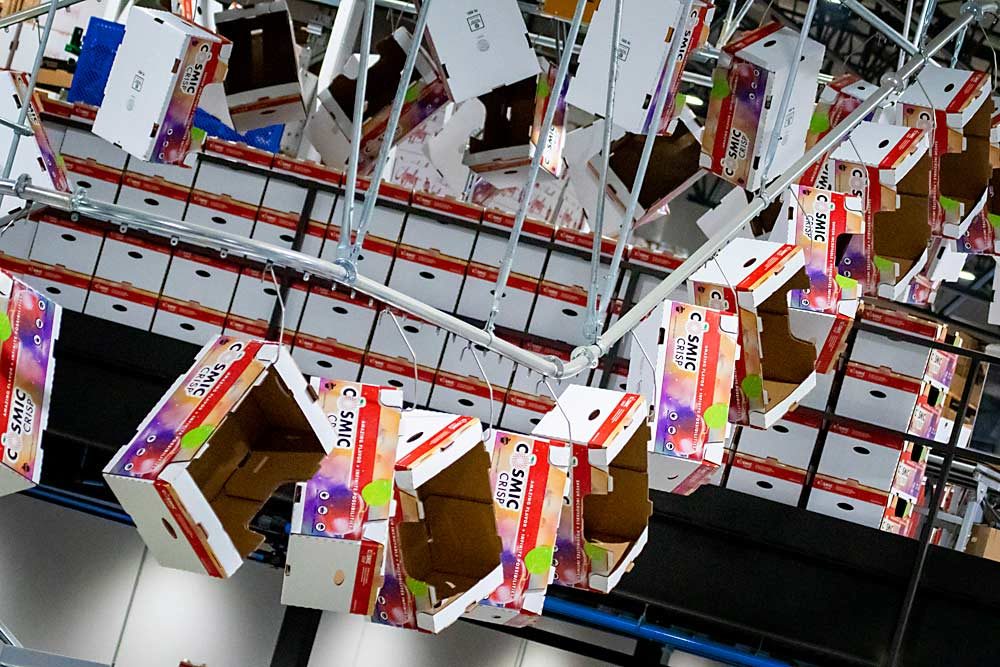
After two decades of development, the Cosmic Crisp apple finally launched for sale and enjoyed some debut fame.
Media swooned, shoppers lined up, stores sold out.
“So, a star was born,” said Lynnell Brandt, president of Proprietary Variety Management, or PVM, of Yakima, Washington, to growers in December.
Brandt and Washington State University spent a session of the Washington State Tree Fruit Association Annual Meeting in Wenatchee on WA 38, reporting on media coverage, research studies, royalty distributions and other matters related to WSU’s newest apple variety, marketed under the trade name Cosmic Crisp.
Bolstered by national hype, all of the Cosmics eligible for commercial shipping in December were shipped, Brandt said. WSU and PVM, contracted by the university to manage the variety’s commercial rollout, released third-leaf fruit for sale on Dec. 1, 2019. The second-leaf fruit sales began on Jan. 1.
By the end of December, the industry had shipped 163,000 40-pound box equivalents of Cosmic Crisp, a small drop in the state’s 40.8-million-box overall apple bucket, according to the Washington State Tree Fruit Association.
The industry estimated a total of roughly 346,000 boxes of Cosmics for the 2019–2020 shipping season, down from their original projection of 460,000, as more second-leaf growers than anticipated decided to let their trees grow another year before cropping, Brandt said.
Shoppers delivered good reviews, too, said Kathryn Grandy, PVM marketing director. The only complaint was high prices, though no one told her they weren’t worth it, she said. At most stores, the apples hovered between $1.99 and $3.50 per pound.
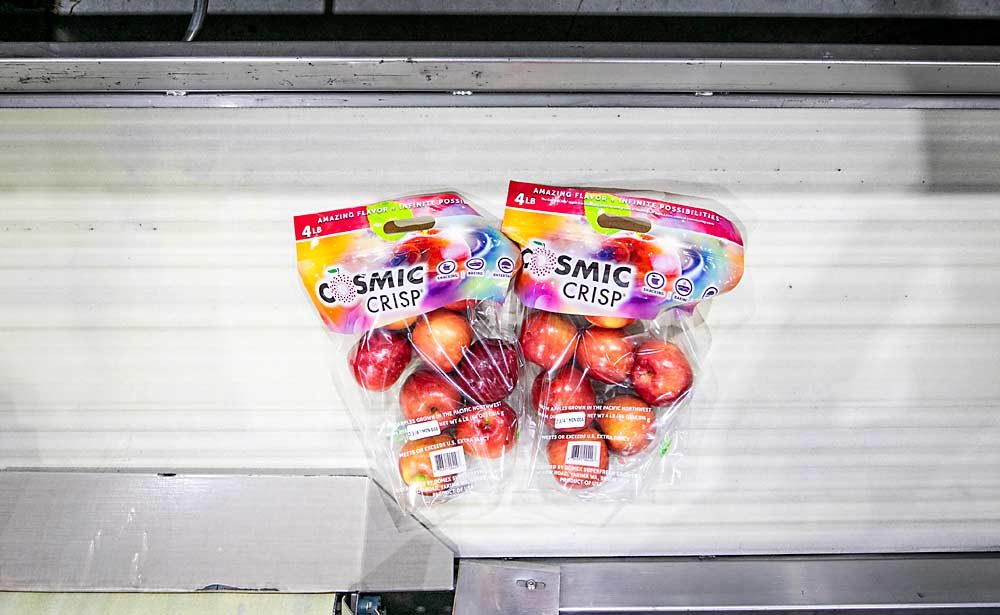
Media blitz
News reports from national outlets and social media covered the launch heavily, yielding publicity worth $47.6 million, according to PVM’s media tracking service. “It’s been a flurry,” Grandy said. “It’s been amazing.”
A single segment on NBC Nightly News accounted for $5.2 million of that estimate. The 2-minute clip featured interviews with growers and shoppers, panoramic B-roll of the mother tree at Columbia View research orchard near Wenatchee and footage of Cosmic-chomping children.
Meanwhile, Good Housekeeping gave the Cosmic Crisp its “Nutritionist Approved” emblem, opening the door to sampling at the magazine’s events, Grandy said.
Marketers call that attention “earned media coverage,” as opposed to paid advertising or “paid media coverage.” PVM spent little on the latter, Grandy said.
Also, PVM is working on marketing secondary products for the Cosmic, such as sliced apples through Crunch Pak, Litehouse cider, a pie from Remlinger Farms in Carnation, Washington, and even Cosmic Crisp Apple Pie Bark from Seattle’s Theo Chocolate.
Royalty distributions
The Cosmic has been generating income for WSU in the form of royalties since the first plantings in 2017. However, costs have piled up, too, said Scott Hulbert, associate dean of research.
WSU collected roughly $4.4 million in gross tree royalties in 2017 and 2018. The university and PVM charge $1 in royalties for every tree sold, split 65 percent and 35 percent, respectively. They also charge a 4.75-percent royalty on every 40-pound box equivalent of apples shipped.
After costs, half of WSU’s cut goes to the university’s apple breeding program, directed by Kate Evans in Wenatchee. The university distributed about $190,000 in 2017 and $1.6 million in 2018.
However, that’s it for a while, Hulbert said. The WA 38 commercialization program will be in the hole for a few years to fund ongoing marketing and legal intellectual property protection costs. That debt had to be approved by the WSU Board of Regents.
To boost the odds of commercial success, WSU and PVM collectively plan to spend about $10.5 million for marketing over five years. The university projects the Cosmic Crisp to become profitable in 2022, when PVM will begin to pay its 30-percent share of that obligation.
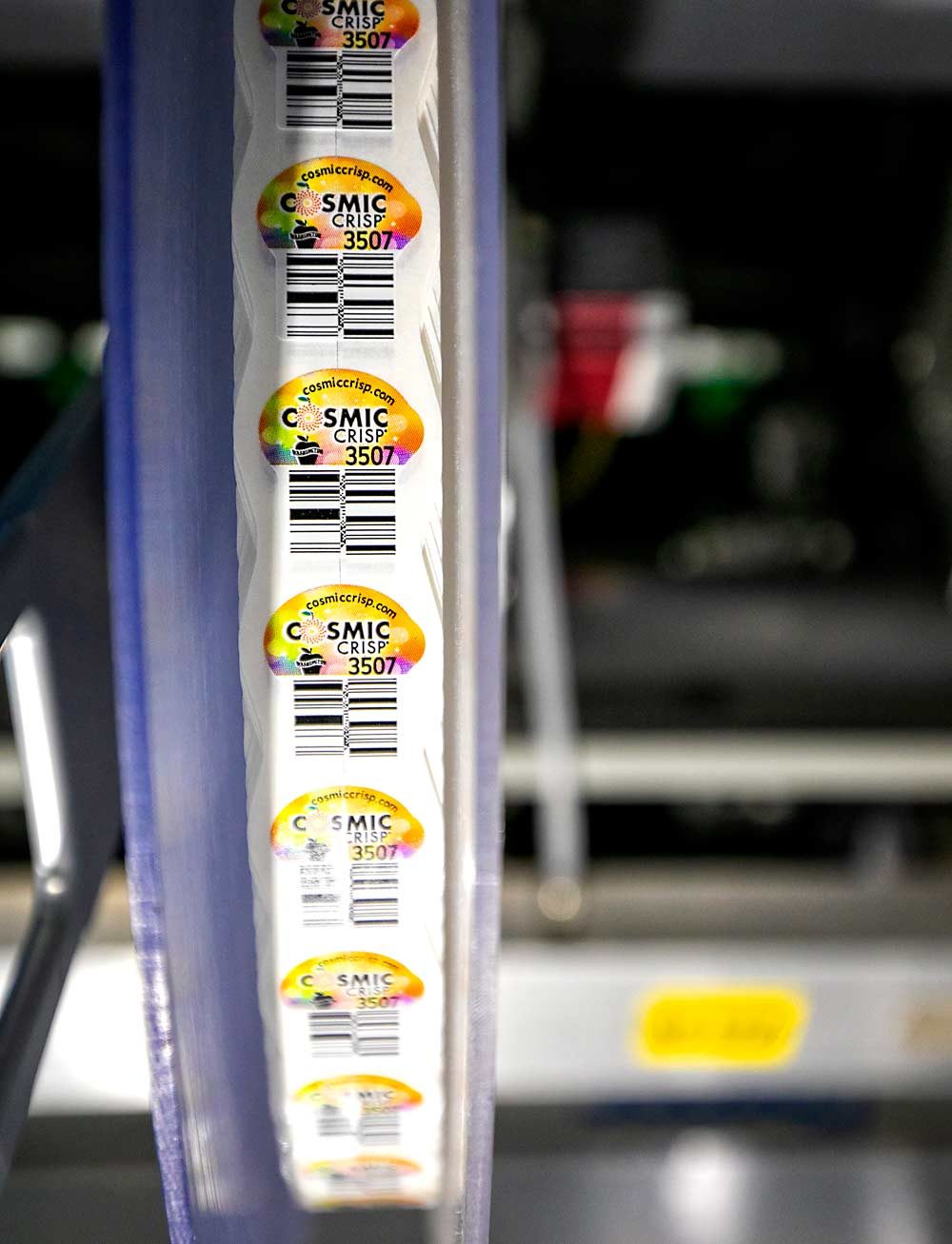
Trademark protection
Trademark protection costs money, too. In 2019, the university expected to spend $1 million or more on outside counsel to defend the brand, investigate illegally propagated trees and other legal matters, said Albert Tsui, business development specialist for WSU.
“You need to defend your turf, and that’s what we have done,” Tsui said.
Under patent law, the university can seek damage up to triple the royalties and demand the destruction of all unlicensed trees and fruit.
The university also has taken measures to protect intellectual property throughout the world. Tsui showed a map with dozens of locations of trademarks.
Washington growers have an exclusive window of at least 10 years to grow the WA 38 in North America. However, WSU has shipped plant material to start test blocks overseas. Most countries require variety managers to file for plant breeders’ rights within six years of the first commercial offering, which was 2014 for the WA 38. To do that, those countries must have material in their quarantine programs. If the university did not take those steps, the apple would become in essence a public commodity, internationally, with no way to prevent unlicensed propagation, Tsui said.
Two Italian companies made their first commercial plantings of 30,000 trees in 2019.
Domestically, farm stands were one exception to the Dec. 1 launch date. Direct-market growers don’t send fruit to warehouses, so WSU allowed them to sell Cosmic Crisps in October and November under a “farm gate” license. Fruit from fewer than 2,500 trees fit that category, compared to almost 11 million trees planted overall, Tsui said.
Overproduction?
In one of the final moments of the presentation, Brandt addressed concerns of oversupply. The industry expects 10.5 million boxes to reach the market in 2022.
That’s not too many, he assured. The Cosmic will attract new apple consumers both domestically and overseas, as well as displace other less-profitable varieties. Besides, 10.5 million boxes is negligible compared to the overall global apple production and demand.
“That is our absolute conviction,” he said. “We are not anywhere close to beginning to think about overproduction.” •
—by Ross Courtney
Related:
—Packing performance good for first Cosmic Crisp
—Harvest of Cosmic proportions
—Hort Show sessions end with a Cosmic bang

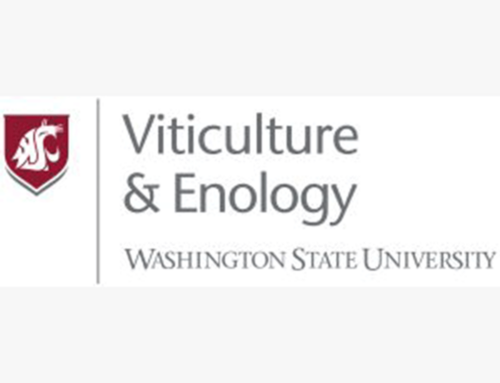

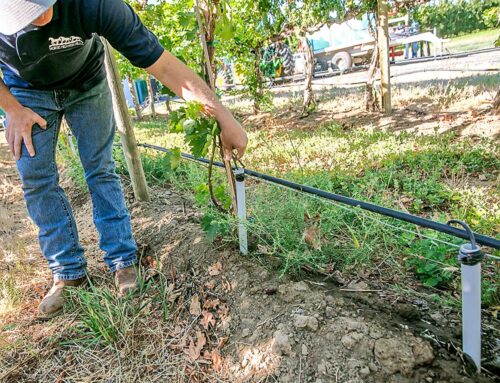
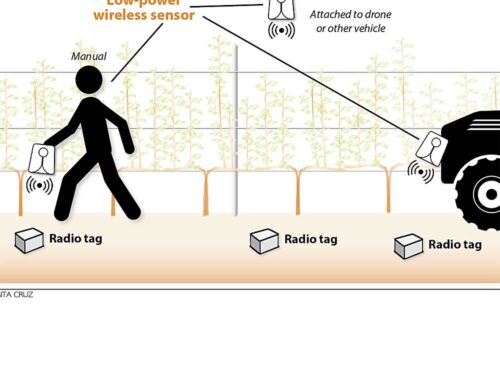
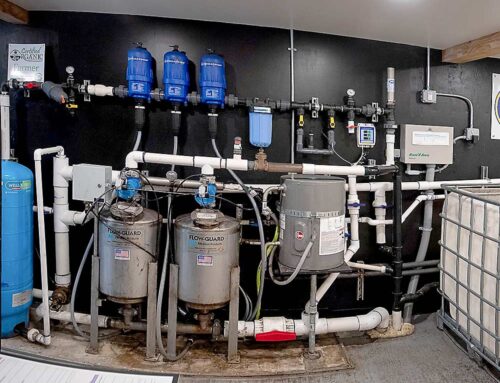
Leave A Comment